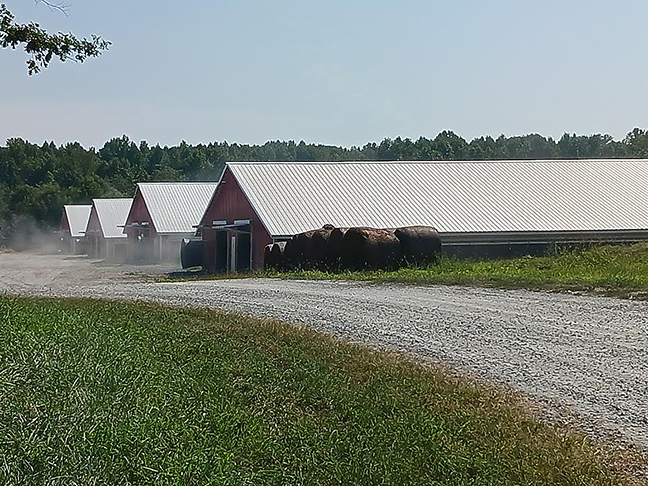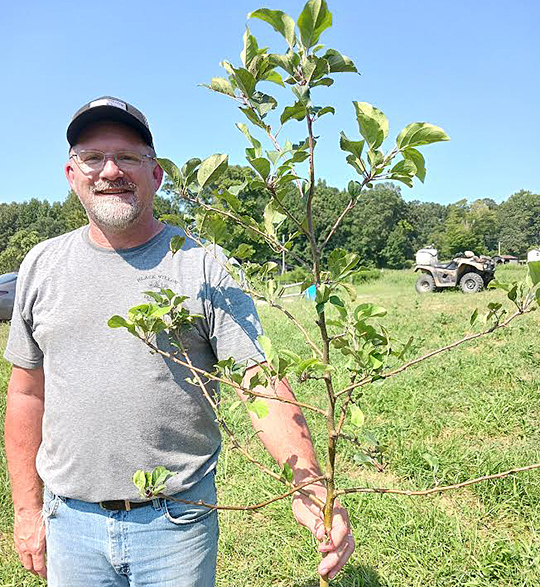Welcome!

In Seagrove, the Black Willow Farms’ chicken houses produced 7 million pounds of chicken last year. Larry Penkava/Randolph Hub
ALL IN THE FAMILY
SEAGROVE — Black Willow Farms is becoming known for environmental stewardship and diversification.
This spring the North Carolina AgVentures Grant Program, part of NC State’s Cooperative Extension, was instrumental in getting the farm a grant from the NC Tobacco Trust Fund Commission.
“We were the only farm in Randolph County with a full funding of $8,000,” said Steve Maness, who owns Black Willow Farms with his wife Christine. “We bought 400 apple trees with four varieties — Gala, Fuji, Honeycrisp and Crimsoncrisp, We’ll also use some of the funds for an irrigation system from a well we dug. We’ll put in the system in the winter.”
Black Willow Farms could have used the irrigation system this summer during a prolonged drought. “The drought was bad but the deer were worse,” Maness said, pointing out the missing top branches of some of the tender young trees.
The Manesses moved to the farm in 2003, after Steve’s parents purchased the land in 2000 from relatives of his mother, who had owned the land since 1926. It will qualify as a Centennial Farm in two years, meaning it’s been in the same family for 100 years.
Since moving to the farm, the Manesses built a new home and have raised grass-fed black Angus cattle. Maness’ father, Dwight Atkinson, ran the farm, raising cattle and harvesting hay during the past 21 years as Steve and Christine have worked other jobs. The Maness’ two children, Tyler and Rebecca, also have major roles at the farm.
Over the years, Maness has worked as a tool maker, in maintenance and even was head of Randolph Community College’s industrial programs. During that time, he began planning to raise chickens. They now have four large chicken houses with plans to add more.
Maness said they currently have between 40 and 50 head of cattle and last year produced seven million pounds of chicken. Tyler is flock supervisor, working full-time on the farm.

“We wanted to branch out and diversify,” Maness said. “We met with Randolph Extension to see what we could do. I’ve always been intrigued with apples.”
The apple orchard brings Rebecca into the fold. She’s currently enrolled in RCC’s Agricultural Business program with certification in zoological horticulture. She has interned with the NC Zoo’s horticulture department.
Rebecca plans to transfer to NC State for more horticulture instruction before coming full-time to the farm, her father said.
“She wants to have greenhouses for decorative plants and manage the orchard,” Maness said. “Our plan is for the whole family to work here together.”
As part of the environmental stewardship, Maness said, they have created a 12-foot buffer along Bachelor Creek, which runs through the farm. “There is one mile of natural buffer along the creek and we use organic fertilizer on the orchard. We want to make sure we steward commercial agriculture and coexist with agritourism.”
After the apple trees mature in four to five years, he said, “we’ll raise about 50,000 pounds of apples per year. With another 100 Winesaps next year, that’ll add 10,000 pounds, enough to pay my daughter.”
Maness said his son, Tyler, had tried public work but wasn’t happy. He chose to work on the farm instead.
“My son likes having his own schedule and my daughter has a green thumb,” Maness said.
Black Willow Farms is a member of the Randolph County Voluntary Agricultural District, solidifying the goal of keeping the land in farming.
If that weren’t enough, Mountaire, the Maness’ chicken processor, issued Maness its Environmental Stewardship Award and nominated him to represent the company’s 500-plus poultry farms. “That means a lot to me,” he said.
There’s a saying that the first generation buys the farm, the second generation builds it and the third generation sells it.
Maness said he includes Tyler and Rebecca in decision-making so “they feel they have a say, a future. It means a lot to me to know my kids are going to carry it on, and it’s because they want to.”
